A Comprehensive Guide to Greek God Names, Meanings, and Mythology
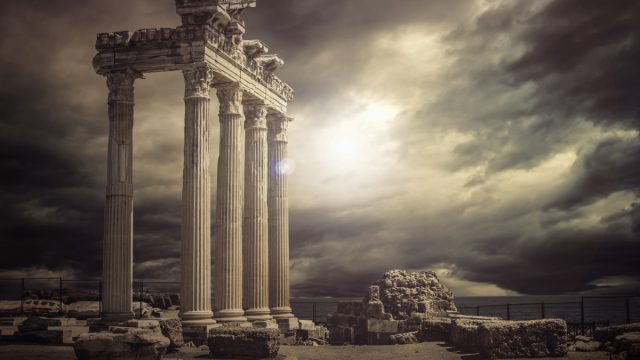
Whether you’re preparing for a classics exam or trying to show off to a date, you may be looking to brush up on the Greek god names, along with those of the goddesses, as well as what they mean. With several generations of deities and the minor characters they meet along the way, it can be hard to keep the mythology straight. Below, we’ve put together a helpful list of who’s who on Mount Olympus. So read on in order to ace the exam, impress your friends, or simply enjoy the satisfaction of learning something new.
RELATED: 120 Fun Trivia Questions for Kids (With Answers)!
Who Are the Greek Gods and Goddesses?
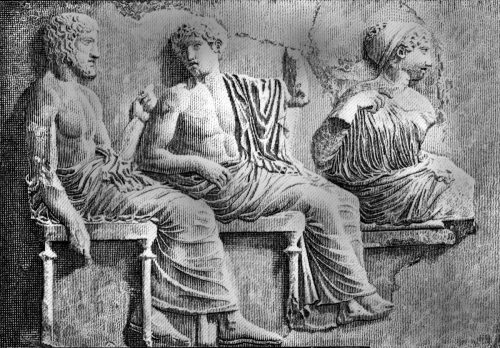
The ancient poets Hesiod and Homer are often credited with establishing Greek mythology, though Hesiod’s epic Theogony is really what gave life to the gods.
The 1,000-line poem, which translates to “The Birth of Gods,” describes how the universe first came into being. According to Hesiod, it all started with Chaos, the personification of absolute nothingness. From there came love, earth, mountains, and the sea, and other components that help make up the universe, each represented by a different deity.
They are called the Primordials and they form the basis of the ancient Greek religion, being worshipped and revered for upholding the ideals of the ancient Greek people. They would later give birth to Titans, the second generation of gods to rule the Greek pantheon. And the Titans would eventually go to battle with their own children, the Olympians.
The conflict, also known as the Titanomachy, would last 10 years, ending with the Olympians defeating their parents. From there, the group settled on Mount Olympus to rule the universe.
Of course, that’s the abbreviated version, but we’ve provided many more details below. Read on to learn more about the gods and goddesses involved in the story and the powers they possess.
The Primordial Gods
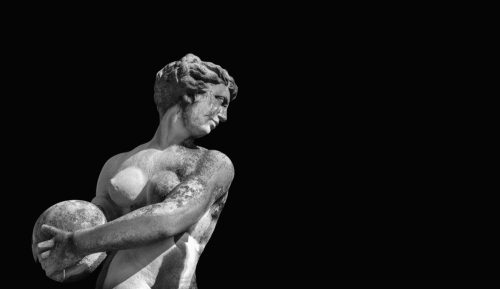
Chaos: Chaos represents the nothingness that all else sprung from. He is also known as the god of the void and is responsible for creating the first beings, Gaia, Tartarus, Uranus, Nyx, and Erebus.
Ananke: Anake is the goddess of inevitability, compulsion, and necessity. In Hesiod’s version of the story, she emerged at the dawn of time as an incorporeal, self-formed being. Other creation myths speak of her alongside her mate Chronos, the primordial god of time, intertwined in serpent form and tied around the “primordial world-egg,” a symbol of pre-creation.
Chronos: Chronos is the primordial god of time. He is credited with helping to create the universe alongside his consort Ananke by splitting the world into earth, sea, and sky. He is often depicted in serpentine form with three heads: that of a man, a bull, and a lion.
Aether: Also spelled Aither, Aether is the primordial god of light. He is also the personification of “blue ether,” or the bright and clear part of heaven. He and his sister, Hemera the primordial goddess of the day, are the opposite of their parents: Erebus, the god of darkness, and Nyx, the goddess of night.
Hemera: Hemera is the goddess of the day. According to Heriod’s writings, she is the daughter of Nyx and Erebus and sister to Aether, the god and personification of light. Some poets, however, asserted that she is instead the daughter of Chronos and others that she emerged from Chaos alongside Nyx.
Erebus: Erebus is the personification of darkness. He had no physical form, existing exclusively as a ghost-like figure. He is the offspring of Chaos and the father of Aether and Hemera by Nyx, the goddess of night.
Eros: Eros is the god of love and sex. In Hesiod’s world, he was the son of Chaos, though later traditions have him as the son of Aphrodite by Zeus, Ares, or Hermes, all of the Olympian generation. They also recognize him as the god of fertility. In late antiquity, he was actually worshiped by a fertility cult in Thespiae, which is modern-day Boeotia.
Gaia: Gaia is the personification of Earth, also called the “mother Earth” or “mother goddess.” It’s believed that all other gods and goddesses descended from her. According to Hesiod, she gave birth to Uranus, whom she later married. Together, they created the twelve Titans. Hesiod also asserts that she bore three one-eyed Cyclops, three Hecatoncheire, and the 100-handed and 50-headed Giants.
Nyx: Nyx is the primordial goddess of night and possesses the ability to put men to sleep. Even Zeus, the leader of the Olympians, fears her. She is the offspring of Chaos and the mother of Aether and Hemera by Erebus, the god of darkness.
Ourea: The Ourea are the primordial gods and personification of the mountains. Unlike the other gods, they are not typically involved in the struggles of humankind. They are instead looked upon as earthly entities, growing more reclusive as civilization further developed. The Ourea are typically depicted as old men with gray beards perched atop the largest mountains in Greece.
Pontus: Pontus is the god of the sea and father of the sea creatures. The son of Gaia, he is often depicted with crab-claw horns growing out of his head.
Tartarus: Tartarus represents the lowest point of the universe, embodying an area below the underworld, though separate from it. According to Hesiod, Tartarus exists “as far below the earth as heaven is from the earth” is also called “Misty Tartarus,” thanks to his dismal, dark, and at times monstrous appearance.
Uranus: Uranus is the personification of the sky and the heavens. He is referred to as both the first offspring of Gaia as well as her primordial partner. Together, the two of them created the Titans, the Cyclops, the Hecatoncheires, and hundreds of Giants. He was eventually overthrown at the dawn of time by his son, Cronus.
RELATED: Fascinating Science Trivia Questions (With Answers)!
The Titan Gods and Goddesses
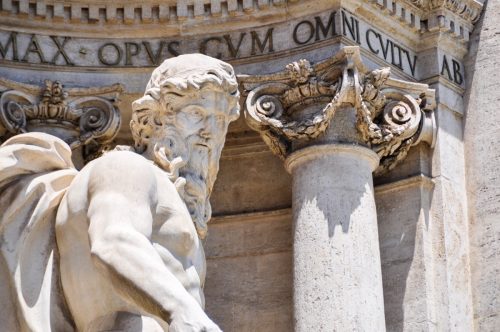
Coeus: Coeus is the Titan god of the North. Often considered the wisest of the Titans, he possesses the gift of prophecy.
Crius: Crius is the god of the heavenly constellations, representing one of the four cosmic pillars separating heaven and earth.
Cronus: Cronus is the god of time and the youngest of his generation. He would eventually lead the uprising against his father and become the leader of the Titans.
Hyperion: Hyperion is the Titan god of heavenly light. He is also known as the “Titan of the East” or the “Titan of the Sun.”
Iapetus: Iapetus is the Titan god of mortality and father to Atlas, Prometheus, Epimetheus, and Menoetius.
Oceanus: Oceanus is the eldest of the Titans and the god of the freshwater river Oceanus, which is said to encircle the Earth.
Mnemosyne: Mnemosyne is the Titan goddess of memory. She is also the mother of the nine muses who entertained the gods on Mount Olympus by singing, dancing, music, and performing poetry.
Phoebe: Phoebe is the Titan goddess of intelligence responsible for granting knowledge to both gods and mortals. The brightness and radiance of the moon are regarded as a symbol of her intellect.
Rhea: Rhea is the Titan goddess of motherhood and fertility. She is also believed to have borne all 12 Olympians, which is why she was also often referred to as the “Mother Goddess” throughout Ancient Greece.
Tethys: Tethys is the Titan goddess of the rivers and freshwater. She was the wife of Oceanus and mothered over 3,0000 river gods.
Theia: Theia is the Titan goddess of light and vision. She married Hyperion, the god of heavenly light. Together, they had three children Selene, Helios, and Eos, each capable of manipulating light.
Themis: Themis is the Titan goddess of divine law and order. Some traditions hold that she would betray her siblings in the Titanomachy, siding with the Olympians and eventually becoming Zeus’ second wife.
RELATED: 100 Fun Bits of Trivia Guaranteed to Make Your Day.
The Olympians: The Twelve Gods of the Pantheon
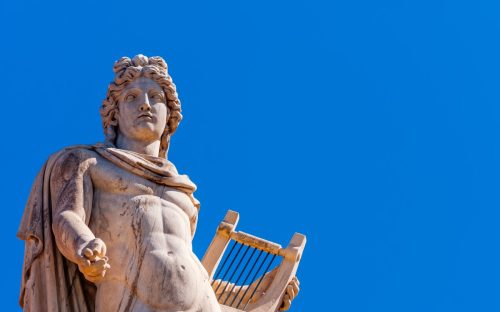
Apollo: Apollo is the ancient Greek god of the sun, music, poetry, and art. He is also the twin brother of Artemis and frequently depicted surrounded by the nine muses.
Aphrodite: Aphrodite is celebrated as the goddess of love and beauty. Her symbols include doves, roses, and myrtles.
Ares: Ares is the Olympian god of war, bloodlust, and violence. His half-sister, Athena, represents the more rational and just aspects of combat.
Artemis: Artemis is the Greek goddess of the hunt, wild animals, chastity, and childbirth. She is often depicted with a deer or hunting dog nearby. The Temple of Artemis at Ephesus was named after her and was one of the Seven Wonders of the Ancient World.
Athena: The ancient Greeks revered Athena as the goddess of war and wisdom. The Parthenon in Athens was originally dedicated to her.
Demeter: Demeter is the goddess of harvest and agriculture and the mother of Persephone, queen of the underworld.
Dionysus: Dionysus is the god of wine, theater, and fertility. He is the youngest of the Olympian gods.
Hera: Hera is the Greek goddess of women and marriage and the protector of women during childbirth. As Zeus’ longest-standing wife, she was also known as “Queen of the Gods.”
Hephaestus: Hephaestus is the god of fire, metalworking, stone masonry, forges, and the art of sculpture. He was married to Aphrodite, though the two did not have any children together and later divorced due to her on-going love affair with Ares.
Hestia: Hestia is the virgin goddess of hearth and home. She eventually gave up her place on Mount Olympus for Dionysus, which is why she is sometimes excluded from the list of Olympians.
Hermes: Hermes is the messenger of the gods, also known as the “Messenger God.” He was able to travel between realms on his winged sandals.
Poseidon: Poseidon was celebrated as the sea god, though he also reigns over horses and earthquakes. While he possesses a human form, he fathered the winged horse Pegasus as well as the Cyclops Polyphemus, who is blinded by Odysseus and company in the Odyssey.
Zeus: Zeus is the king of the gods who ruled over Mount Olympus. He is also known as the god of thunder and lighting, along with law and order.
RELATED: The 13 Longest Words in the English Language.
Greek God’s Names in Planets
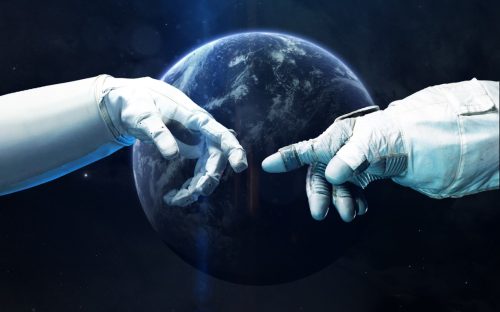
Many prominent figures in ancient Roman mythology were lifted from Greek traditions. The Romans were also responsible for naming the majority of planets in the solar system, which is why so much crossover exists. Below, we’ve broken down which god corresponds with each planet and what their Greek equivalent is.
- Jupiter: The Roman name for Zeus. The planet’s 79 moons are mostly named after his lovers or daughters.
- Mars: The Roman name for Ares.
- Mercury: The Roman equivalent of Hermes.
- Earth: The Roman equivalent of Gaia.
- Neptune: The Roman equivalent of Poseidon.
- Saturn: The Roman name for Cronus. The names of the planet’s 82 moons are also derived from Greek myths.
- Uranus: The only planet that actually kept its original Greek name.
- Venus: The Roman name for Aphrodite
Other Greek Gods and Goddess
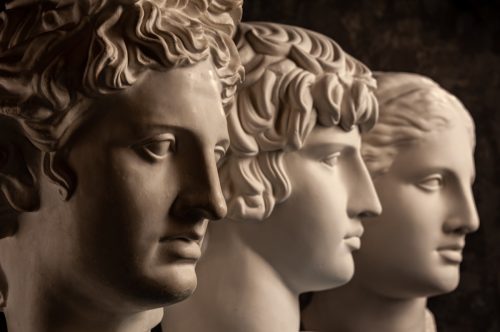
Greek mythology has given rise to hundreds of gods and powerful deities, though few are as well known as the Primodoridals, Titans, and Olympians. Below, we’ll walk you through a few familiar names that are worthy of review.
- Achelois: Achelois is a minor moon goddess whose name means “she who washes away pain.”
- Adonis: The god of beauty and desire. He was also a lover to both Aphrodite and Persephone.
- Attis: Attis is the minor god of vegetation, fruits of the earth, and rebirth.
- Electra: Electra is an ancient nymph associated with storm clouds and wind.
- Glaucus: A fisherman who became immortal upon eating a magical herb, Glaucus eventually became the god of the sea. His name is derived from the Greek word for “grayish blue” or “glimmering.”
- Hecate: Hectate is the goddess of magic, witchcraft, and night.
- Hercules: Hercules is the demigod of heroes, sports, athletes, health, agriculture, fertility, trade, oracles, and the divine protector of mankind. He was also known as the strongest man on Earth.
- Iris: Iris is the goddess of the rainbow and messenger to the Olympian gods.
- Nereus: A sea god referred to by Homer as the “Old Man of the Sea.”
- Prometheus: Prometheus is the god of fire. He also defied the Olympians by stealing their fire and giving it to the mortals in the form of knowledge, technology, and other important aspects of civilization.
Wrapping Up
That’s it for now, but be sure to check back with us soon for even more educational trivia. You can also sign up for our newsletter so you don’t miss out on what’s next.
- Source: Moons of Jupiter
- Source: Saturn Moons